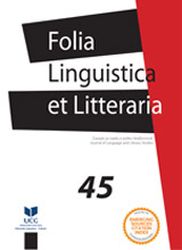IL SOLDATO INESISTENTE DI BUZZATI E KADARE (IL DESERTO DEI TARTARI E IL GENERALE DELL'ARMATA MORTA)
THE INEXISTENT SOLDIER IN BUZZATI E KADARE (THE DESERT OF THE TARTARS AND THE GENERAL OF THE DEAD ARMY)
Author(s): Alva DaniSubject(s): Albanian Literature, Theory of Literature, Italian literature
Published by: Filološki fakultet, Nikšić
Keywords: soldiers; narration; inexistence; absurdity; death; waiting
Summary/Abstract: The two novels, Deserto dei Tartari (The desert of the Tartars) (1940) by Dino Buzzati, of the early twentieth century in Italy and Il Generale dell'armata morta (The general of the dead army) (1963) by Kadare, an Albanian writer of the second half of the twentieth century, are considerably successful books of a wide reception and translated into several languages. The background to both works is the Second World War. A war that is about to begin in Buzzati and the memories and consequences of this war in Kadare. A general and a lieutenant have almost the same mission and the same duty, that of leading an army of soldiers and preparing to fight. But neither of them carries out his military duty, there is no enemy to fight against. The state of mind and its adaptation to circumstances, the transformation of man's expectations and ambitions in front of life reality are elements that run through the pages of the two writers’works. Unlike Buzzati's work, with little indication on the historical location and geographical area of the events, in Kadare’s work the historical and geographical context is very precise. It is 1963, twenty years after the end of the Second World War, when a general and a colonel chaplain of the Italian Army were entrusted with the task of finding the remains of the Italian soldiers who fell in Albania. The historical reality that unites the two events is the gray and cold atmosphere of the war, of a war that produces almost the same sensations, the same fears and disappointments. At first sight, everything revolves around the war and its consequences; the words and phrases do nothing but reconstruct a particular war background. There are soldiers, generals, lieutenants, sentries, battalions, colonels, graves, regulations, provocations and then there are the enemies, there are the foreigners. The two protagonists who must carry out the mission entrusted to them are Lieutenant Drogo and the General of Kadare, both infected by that heroic climate of greed for glory. Both of them leave their own city to reach their destination, a strange place never seen before; one towards the desert of the Tartars and the other towards the foreign land, Albania. The young lieutenant Giovanni Drogo is promoted to officer and is assigned to the Bastiani Fortress. The fortress, an outpost of a remote border site, is mysteriously threatened by the invasion of the mythical enemies, the Tartars. Its existence is now upset by the huge abyss that separated imagination and reality. The two official protagonists of the two works are actually two soldiers from two armies, sent to carry out a military mission. But we see that this assignment was not at all what they expected. They are soldiers prepared to fight, to make real war, with the weapons smell and the enemy’s defeat. The figure of our soldier is emptied of the main characteristics of the fighter and consequently his role is completely meaningless. Now his everyday life is dominated by nightmares, sleeping pills, alcohol, headaches, death that had invaded his soul as well. What good can a whole dead army do? What can a general do with a dead army? An absurdity, a constant chasing after something that, once achieved, is no longer what he was expecting. At this point, everything resembles the fate of Giovanni Drogo, a soldier unable to fulfill his role as a soldier, even if obedient to the rules that mark his life. The absence of a real external enemy makes the presence of those soldiers in that desert almost useless, as does the existence of the border itself and the Bastiani Fortress. If Lieutenant Drogo cannot face the enemy and die in battle, then what is the point of waiting all life on the frontier? At this point, the border, positioned in the desert, seems nothing more than a symbol of solitude and an almost eternal senseless waiting. Another element that helps to build the world of the two protagonists and that allows some associations is nature. A very suggestive stylistic choice from the very beginning of the work, which could also be read as a key to understanding much more about the inner world of the protagonists, what they feel, how and why they behave and react. A nature capable of reflecting and warning of everything that is about to happen. The strong presence in the background of the nature elements and their relationship with the events that occur, is also very evident in Buzzati's work. To conclude, we can say that in both novels the war turns out to be a strong disappointment. The lust for glory of both the general and the lieutenant is contrasted with strong symbolism by the search for a definitive truth about his own existence. The only truth that unites the two authors is death. The lieutenant who awaits death and the general who gathers it everywhere are another common aspect that unites them. The strong presence of nature could not be a random element, it is the ongoing background to the mood and human emotions. Although they do not claim to be exhaustive, these observations want to highlight the fact that these two beautiful novels have many things to say and represent a beautiful literary heritage, shared between two writers joined and separated by the same sea, the Adriatic.
Journal: Folia Linguistica et Litteraria
- Issue Year: 2023
- Issue No: 45
- Page Range: 247-258
- Page Count: 12
- Language: Italian

